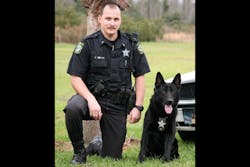K-9's Death Leaves Florida Deputy With Empty Feeling
NEW PORT RICHEY, Fla. -- Mornings this week have been different. Empty. Pasco sheriff's Deputy Robert Wilkins hasn't gotten ready for work alone in nearly eight years.
He used to spend almost all of his waking moments shadowed by a dark figure, fluffy with pointed ears, a wet nose and deep brown eyes: Lee.
The black German shepherd knew the sound of Wilkins' jingling patrol SUV keys. They made him scramble out the door, ready for the ride. Wilkins said Lee loved going to work.
They didn't choose each other. Lee, then a 1 1/2-year-old imported from the Czech Republic, was a police dog issued to Wilkins by the Pasco County Sheriff's Office.
"You get what you get," Wilkins said. "They're like people. All have their own personalities."
Man and dog forged their bond over 600 hours of training. Tracking, searching buildings and detecting narcotics. Wilkins said Lee could read his stress through all of the sessions. He was an excitable dog at work. Calm at home with Wilkins' wife Rose, son Jacob and hound Copper.
They were quick to find out that Lee was one of the pack.
He was known for burrowing his head under the hand of anyone on the couch. He made nightly welfare checks while the family slept, prodding them with his wet nose just enough to make them stir in their sleep to know they were safe.
In training, Lee showed high drive but a short attention span that made his master laugh.
During long training scenarios, Wilkins said, Lee would sometimes stop and stare off into space until a command would snap him back into duty.
In other scenarios, Lee would drop his toys in front of "bad guys," urging them to play. He did it a few times on duty, too.
"He didn't care who you were," Wilkins said. "He'd play with you."
At work, they tracked suspects, conducted narcotics searches and set up SWAT perimeters. At home, once every six months or so, Lee would gnaw the heels off Rose's shoes. Wilkins would have to take her shopping.
Like all canine unit dogs, Lee was trained to meet aggression with aggression on duty. But Wilkins remembers Lee bending to the will of a toddler when Jacob, now 13, would tell him to "go lay down."
By the time Lee was 9, gray powdered his muzzle. He had slowed a little. Wilkins said it's common for working dogs Lee's age to develop bone spurs that can numb their hind legs.
On Friday, he took Lee to the veterinarian for a check-up. The vet took an X-ray of Lee but came back with startling news.
Lee had developed a tennis ball-sized mass on his spleen.
"Was it something he ate?" Wilkins asked.
"No," the vet told him. It was a tumor. He figured Lee had six months left in him.
The vet did blood work and sent them home with antibiotics.
But Lee faded faster, much faster, than the vet predicted.
On Sunday, he refused food and water. That night, there was no welfare check.
Monday morning, Rose was getting ready for work early when she called back to her husband.
"Can you go check on Lee?" she asked him. "I don't think something's right."
"Lee!" Wilkins called, expecting the dog's head to pop up from the front door spot where he slept. But Lee was still.
Wilkins went over and shook him, but he was gone.
Now, mornings are lonely. There's a spot missing on daily patrol. Copper noticed it, too. Earlier this week, the hound searched every room in the house after seeing the empty dog bed next to his own.
The Sheriff's Office said it will issue Wilkins another dog if he wants.
There will not be a memorial service for Lee, Wilkins said. He's not sure what he'll do. He said he needs time to clear his mind.
On the side of his patrol SUV, under the canine unit sticker are still two names, monogrammed in cursive "Copper & Lee." Wilkins hasn't brought himself to correct it.
"As far as I'm concerned," he said, "it can stay for a while."
Copyright 2013 Times Publishing Company. All Rights Reserved




